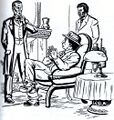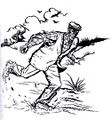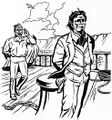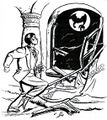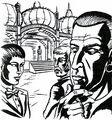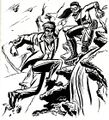All-Consuming Fire (novel): Difference between revisions
Eyacorkett (talk | contribs) m (→Notes) |
No edit summary |
||
| Line 190: | Line 190: | ||
=== The Great Old Ones and the DWU === | === The Great Old Ones and the DWU === | ||
A brief speech by the [[Seventh Doctor]] defines who the [[Great Old One]]s are. This ties together several creatures encountered in ''[[Doctor Who]]'', and binds them in a common group with other mythologies, such as the [[H. P. Lovecraft]] [[Cthulhu]] stories. He says that the following are "Great Old Ones": Cthulhu, the [[Gods of Ragnarok]] (from ''[[The Greatest Show in the Galaxy (TV story)|The Greatest Show in the Galaxy]]''), [[Nyarlathotep]], [[Dagon]] (who is said to be worshipped by the [[Sea Devil]]s, implying the Sea Devils to be the same as Lovecraft's Deep Ones), Hastur the Unspeakable who "also goes around calling himself [[Fenric]] (as encountered in ''[[The Curse of Fenric (TV story)|The Curse of Fenric]]''), Lloigor (implied to be | A brief speech by the [[Seventh Doctor]] defines who the [[Great Old One]]s are. This ties together several creatures encountered in ''[[Doctor Who]]'', and binds them in a common group with other mythologies, such as the [[H. P. Lovecraft]] [[Cthulhu]] stories. He says that the following are "Great Old Ones": Cthulhu, the [[Gods of Ragnarok]] (from ''[[The Greatest Show in the Galaxy (TV story)|The Greatest Show in the Galaxy]]''), [[Nyarlathotep]], [[Dagon]] (who is said to be worshipped by the [[Sea Devil]]s, implying the Sea Devils to be the same as Lovecraft's Deep Ones), Hastur the Unspeakable who "also goes around calling himself [[Fenric]] (as encountered in ''[[The Curse of Fenric (TV story)|The Curse of Fenric]]''), Lloigor (implied to be [[the Animus]] from ''[[The Web Planet (TV story)|The Web Planet]]''), and [[Yog-Sothoth]]. | ||
The Doctor's statement that he met Yog-Sothoth "once in Tibet, and again in London" implies that Yog-Sothoth is in fact none other than the [[Great Intelligence]], although this is not made explicit, by all appearances because the book was not licensed to use the character of the Intelligence (no such statement is made in the book's copyright section). ''[[Millennial Rites (novel)|Millennial Rites]]'' confirms this connection, whereas other works both earlier and later, such as the TV story ''[[The Snowmen (TV story)|The Snowmen]]'', dispute it. | The Doctor's statement that he met Yog-Sothoth "once in Tibet, and again in London" implies that Yog-Sothoth is in fact none other than the [[Great Intelligence]], although this is not made explicit, by all appearances because the book was not licensed to use the character of the Intelligence (no such statement is made in the book's copyright section). ''[[Millennial Rites (novel)|Millennial Rites]]'' confirms this connection, whereas other works both earlier and later, such as the TV story ''[[The Snowmen (TV story)|The Snowmen]]'', dispute it. | ||
Revision as of 21:13, 5 September 2024
- You may wish to consult
All-Consuming Fire (disambiguation)for other, similarly-named pages.
All-Consuming Fire was a 1994 entry in the New Adventures range of Doctor Who novels. It featured the Seventh Doctor, Ace and Benny in an adventure with the real-life "Sherlock Holmes" and "Dr John Watson".
It was notable for its unusual structure.
At the beginning of the novel, the Doctor gives Benny a copy of All-Consuming Fire by Arthur Conan Doyle, which she duly reads. This sets up a "book-within-a-book", in which the reader is meant to believe that there's an Andy Lane-written prologue and epilogue wrapped around a Conan Doyle novel — itself written from the perspective of "John Watson". In the epilogue, Benny pronounces that Conan Doyle changed "a lot of the facts", meaning that Conan Doyle (or, possibly "Watson") is an unreliable narrator. The main characters seem to agree that Conan Doyle's version is basically true. However, Benny's revelation that she doesn't "remember half of these things happening" makes it difficult to know which details actually occurred within the Doctor Who universe, and which are embellishments by Conan Doyle.
Lane occasionally gives us other points of view, such as when he quotes from Benny's diary. These moments, too, are instances where limited perspective leads to unreliable narration. Indeed, it's not terribly clear whether these moments of taking from other diaries are meant to be Lane interjecting into the Conan Doyle book, or whether it's actually Conan Doyle himself mixing in a bit of Benny's voice into his book.
In any event, All-Consuming Fire — quite unusually for a Doctor Who novel — features a book within a book, told mostly in the first person from the perspective of secondary characters.
Publisher's summary
- "I've been all over the universe with you, Doctor, and Earth in the nineteenth century is the most alien place I've ever seen."
England, 1887. The secret library of St John the Beheaded has been robbed. The thief has taken forbidden books which tell of mythical beasts and gateways to other worlds. Only one team can be trusted to solve the crime: Sherlock Holmes and Doctor Watson.
As their investigation leads them to the dark underside of Victorian London, Holmes and Watson soon realise that someone else is following the same trail. Someone who has the power to kill with a glance. And they sense a strange, inhuman shape observing them from the shadows. Then they meet the mysterious traveller known only as the Doctor -- the last person alive to read the stolen books.
While Bernice waits in nineteenth-century India, Ace is trapped on a bizarre alien world. And the Doctor finds himself unwillingly united with England's greatest consulting detective.
Plot
to be added
Characters
- Seventh Doctor
- Bernice Summerfield
- Ace
- Sherlock Holmes
- Doctor John Watson
- Mycroft Holmes
- Sherringford Holmes
- Arthur Conan Doyle
- Azathoth
- James Moriarty
- Colonel Warburton
- Baron Maupertuis
- Tir Ram
- Jehosephat Ambrose
- K'tcar'ch
- Kate Prendersly
- Third Doctor
- MacDonald
- Hudson
- Smithee
- Jitter
- Mack Yeovil
- Sosostris
- First Doctor
- Susan
- Siger Holmes
Worldbuilding
Books
- Ace has read books by Iain M. Banks.
- When he is at the Library of St John the Beheaded the Doctor is reading a book called Adventures Amongst the Abominable Snowmen by Redvers Fenn-Cooper.
- The library has one of the copies of the Malleus Maleficarum.
Buildings
- Hackney Downs station is a London police station.
The Doctor
- At the Academy on Gallifrey the Doctor failed practical theology but was highly commended for landscape gardening.
- The Doctor leaves the TARDIS in the house of Professor George Litefoot.
- The Doctor says that he does sleep once every hundred years for a decade or so.
- The Doctor was once at a bar on Barrabas Gamma where he paid for a round of drinks using Cimliss money, but it jumped out of his hand and ran away.
Cults
- A cult of Shobogans worshipped Azathoth.
Foods and beverages
- The Doctor drinks sarsaparilla, and notices the smell of strychnine used to ferment the beer Watson drinks.
- Whilst dining on the train in India Sherlock and Bernice drink weak whiskey while Watson drinks a gin and tonic.
- Mrs Hudson serves the Doctor tea and Madeira cake at Holmes' residence.
- Whilst on Ry'leh Watson eats some sort of native creature, which does not sit well for him.
- Holmes and the Doctor have had lobster curry.
Governments
- Mycroft Holmes is in the employ of the British government and/or the British Foreign Office.
- Sherlock Holmes may work for the Foreign Office.
Groups
- The Third Doctor frequents the Diogenes Club.
- The Seventh Doctor gets his third self kicked out of the Diogenes Club by showing him the answer to the crossword he was doing, making the Third Doctor shout at him, breaking the silence rules.
History
- Watson fought in the Second Afghan War.
Individuals
- The First Doctor and Susan make a brief appearance at the beginning and end of the story. He meets Sherlock's father Siger Holmes in Jabalhabad, India.
- Bernice can speak Sontaran and understands Punjabi, Urdu and Telugu.
- This is the first instance where it is suggested Ace lost her virginity to Sabalom Glitz.
- Bernice went once to a seminar on Felophitacitel Major where a Draconian lecturer had a theory that different cults around the universe were all worshipping the same gods.
- Mr Jitter and Mack Yeovil are heads of gangs.
- Smithee is Warburton's secretary.
- Madame Sosostris is a clairvoyant.
- Watson killed a cobra in India.
Libraries and archives
- The TARDIS library has among its books Every Gallifreyan Child's Pop-Up Book of Nasty Creatures From Other Dimensions with four dimensional pop-ups.
Locations
- Bernice comments that 19th century India is the most alien place she has been.
Organisations
- Bernice compares the East India Company's rule in India to the Interplanetary Mining Corporation's activities on Lucifer.
Planets
- The planet Tersurus has clone banks and singing stones.
- The Doctor still has clay and dust on his pants from Menaxus.
- Bernice lived in the slums of Avernus and a squat on Zellen VIII.
- The Doctor dropped Ace early on Ry'leh to investigate.
- Bernice thinks Ry'leh is stranger than Moloch (Lucifer's hollow moon).
- Both Eusapia and Zeta Minor are half in this and another universe.
- The crust of Magla is a shell covering a vast dreaming creature.
Species
- The Rakshassi are named after Hindu demons. Their appearance may be based on the Mi-go.
- The Great Old Ones include: Lloigor (ended up on Vortis), Yog-Sothoth (whom the Doctor encountered once in Tibet and later in London), the Gods of Ragnarok (whom Ace might tell Benny about, if asked nicely), Hastur the Unspeakable (also known as Fenric, whom Ace will not tell Benny about, no matter how nicely she asks), Cthulhu (encountered by the Doctor and company in Haiti), Dagon (worshipped by the Sea Devils) and Nyarlathotep.
- Shlangii are the most feared mercenaries in the universe.
- The Silurians venerated Azathoth.
- The Ook of the Crallis Sector wear clothes that are made out of small animals.
- A Drashig's mating call supposedly sounds like an 18th century passenger ship's horn.
Supposed deities
- Azathoth is a god of anarchy and chaos and is the weakest of the Great Old Ones.
Theories and concepts
- The Doctor does not believe in spontaneous human combustion.
Time Lords
Vehicles
- The journey to India and back is made aboard the SS Matilda Briggs.
- Bernice describes a tikka-ghari.
Weapons
- Ace has a gun that can be disassembled.
- Most of Ace's smart missiles deserted her on Peladon to set up a union with the mining machinery.
- The Doctor grumbles something about Z-Bombs when Bernice and Watson are having a conversation about weapons that were supposedly going to "end wars".
Notes
- The image of Sherlock Holmes on the cover is based on an image of Basil Rathbone's portrayal of the character in The Hound of the Baskervilles.
- This novel is written from the point of view of Watson and Benny's diaries.
- This novel includes eight illustrations by Mike Nicholson.
- According to Andy Lane, Peter Darvill-Evans had told Lane that Holmes and Watson were going to be the new companions in the New Adventures book range. Said Lane, "Even when I finished the book it was still on the cards - hence the ambiguous ending." (DWM 252)
- A prelude to this novel was published in DWM 213.
- In the acknowledgements for the novel The Empire of Glass, Lane notes that this was his own version of Tim Powers' The Anubis Gates.
- In 2015, Big Finish Productions released an audio adaptation of this novel.
- Andy Lane named this as his favourite New Adventure of his own, "because it was such fun to write".
- At the time of the novel's publication, the works of Arthur Conan Doyle were in the public domain in the UK. This changed in 1996, when British laws were amended to reflect those of the European Union. As such, Doyle's creations could not be used again until the copyright expired in 2001, though Holmes and Watson do have cameos in Happy Endings.[1]
References to Sherlock Holmes lore
As a three-way crossover between Doctor Who, the Cthulhu Mythos and Arthur Conan Doyle's Sherlock Holmes, the novel makes numerous references to quirks and lore of the Sherlock Holmes canon.
Firstly, the notion that Arthur Conan Doyle coexists with Watson and Holmes within their fictional universe, as a man who publishes Watson's diaries with some names and details changed to give them an air of fictionality and protect the detectives' identities, is a confirmation of the foundational hypothesis of the "Great Game" which sees Doyle enthusiasts posit that Doyle's Sherlock Holmes canon is actually a historical text, and, from there, attempt to figure out how he connects to various elements of the real world.
Secondly, the novel ties together two of the many "offscreen cases" mentioned by Watson in Doyle's stories and which are the subject of much speculation among fans. In the Sherlock Holmes novel "The Adventure of the Reigate Squire", Watson mentions an unrecorded case called "the colossal schemes of Baron Maupertuis", which schemes are shown in this story to have been the invasion of Ry'leh through the dimensional rift in India. Meanwhile, in the short story "The Adventure of the Sussex Vampire", Holmes says in "a reminiscent voice" that "the Matilda Briggs was a ship which is associated with the giant rat of Sumatra, a story for which the world is not yet prepared." All-Consuming Fire shows the Giant Rat of Sumatra in question to have been an alien creature from Ry'leh, making the reason Holmes's 19th-century world was unprepared for it quite obvious; the SS Matilda Briggs is the ship abord which the characters travel to India in All-Consuming Fire.
Thirdly, the story makes use of the common idea that the Diogenes Club is in fact a front for a secret service loyal to the Crown of England, with Mycroft as its head. This notion, not present in any of Doyle's original stories, is frequently used in adaptations of the Sherlock Holmes mythos, up to and including the later BBC Sherlock reboot headed by Steven Moffat and Mark Gatiss. All-Consuming Fire interestingly shows Holmes and Watson learning of the Club's true nature.
Finally, Squire Sherringford Holmes is a reference to Sherrinford Holmes, a theoretical character as part of the aforementioned Great Game, named for a discarded name Doyle had considered for Sherlock himself, and who is conceived of as the eldest Holmes brother who lived a quiet life and inherited most of the Holmes family's wealth and land.
The Great Old Ones and the DWU
A brief speech by the Seventh Doctor defines who the Great Old Ones are. This ties together several creatures encountered in Doctor Who, and binds them in a common group with other mythologies, such as the H. P. Lovecraft Cthulhu stories. He says that the following are "Great Old Ones": Cthulhu, the Gods of Ragnarok (from The Greatest Show in the Galaxy), Nyarlathotep, Dagon (who is said to be worshipped by the Sea Devils, implying the Sea Devils to be the same as Lovecraft's Deep Ones), Hastur the Unspeakable who "also goes around calling himself Fenric (as encountered in The Curse of Fenric), Lloigor (implied to be the Animus from The Web Planet), and Yog-Sothoth.
The Doctor's statement that he met Yog-Sothoth "once in Tibet, and again in London" implies that Yog-Sothoth is in fact none other than the Great Intelligence, although this is not made explicit, by all appearances because the book was not licensed to use the character of the Intelligence (no such statement is made in the book's copyright section). Millennial Rites confirms this connection, whereas other works both earlier and later, such as the TV story The Snowmen, dispute it.
At any rate, while direct ties to the Cthulhu Mythos were erased, the notion of unimaginably powerful entities who originated in the pre-universe, and who derived their powers from still being bound by the laws of physics of their old world rather than the Doctor's own, recurred in 21st century televised Doctor Who, first with the Beast in The Impossible Planet and The Satan Pit and later with the Ancient Lights in Secrets of the Stars and Death of the Doctor, thereby continuing this makeshift tradition.
Holmes and Watson in the DWU
This novel portrays "Holmes" and "Watson" as the fictional names for non-fictional people. Benny is cut off several times right before she announces the actual names of "Holmes" and "Watson".
This notion that they are real people is confirmed in PROSE: Happy Endings, when the duo show up for Benny's wedding. Later she even meets "Mycroft Holmes" (AUDIO: The Adventure of the Diogenes Damsel)
However, almost every story written thereafter suggests quite the opposite. Evolution, for instance, strongly implies that Holmes and Watson are wholly fictional characters, created by Doyle, based on the Doctor and Doyle himself (although a prelude written suggests that Doyle, altering the characters slightly to protect their true identities, simply based some of the "fictional" Holmes' characteristics on the Doctor). The Snowmen also has Walter Simeon insist that Sherlock Holmes is a well-known fictional character, and the Doctor himself appears to confirm this, though he may simply be responding to Walter Simeon's own belief that they are fictional when he himself knows otherwise.
After many other mentions of Sherlock Holmes as a wholly fictional character, the stories The Book of the Enemy and Erasing Sherlock finally provided an in-universe explanation for the discrepancy, showing that Sherlock Holmes had been erased from time and turned into fiction as part of temporal strategies in the War in Heaven.
Possible unreliability of the text
It is difficult to know how much of the book to take as a genuine account of things which actually happened to the Doctor and his companions, since Benny outright says that the book was a fictionalised version of events and Watson admits within the book himself that he sometimes rewrites portions of his diaries to make himself appear more proactive and heroic before he turns them into publishable books.
Nevertheless, the prologue and epilogue are certainly meant to be read as the "reality" of the DWU, and the basic outlines of the plot are confirmed as generally having happened. Detail within the bulk of the novel should, however be treated with a great deal more suspicion.
Continuity
- The Doctor and many others visit the Library of St John the Beheaded, with which the Doctor is familiar. (PROSE: The Empire of Glass, Theatre of War, Millennial Rites)
- The Doctor says that "if [one] asks her very nicely, Ace will tell [one] about the Gods of Ragnarok (TV: The Greatest Show in the Galaxy) but also that no amount of sweet-talking will get her to speak of Hastur the Unspeakable, a.k.a. Fenric. (TV: The Curse of Fenric) He also mentions his encounter with Cthulhu in Haiti. (PROSE: White Darkness)
- It is established that the fob watch the Seventh Doctor uses is the same one carried by the First Doctor.
- The Doctor says that he has seen fast, rapid movement invisible to the human eye in Raston Warrior Robots, but never in a living creature. (TV: The Five Doctors)
Cover gallery
Illustrations
The interior featured eight illustrations by Mike Nicholson.
The Doctor meets Sherlock Holmes and John Watson.
Benny watches in horror as a Rakshassa carries the Doctor away.
Ace and Watson on Ry'leh.
External links
- Prelude to All-Consuming Fire as published in DWM #213
- All-Consuming Fire at the Doctor Who Reference Guide
- The Discontinuity Guide to: All-Consuming Fire at The Whoniverse
- Sherlockian Story Summary - Andy Lane's All-Consuming Fire
- The Cloister Library: All-Consuming Fire
- Beyond the Book: All-Consuming Fire by Paul Scoones (Article) - TSV 43





